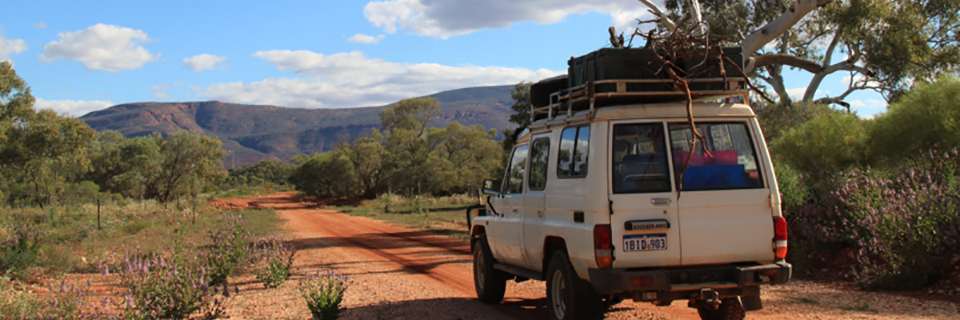Original blog post featured on The Journal by Intrepid, by Jo Stewart.
Got a craving for wide open spaces, blockbuster beaches, out-of-the-way campsites and nights sleeping under the stars? An overland adventure through Australia offers all this plus kangaroos, emus, rock formations, outback larrikins, bush pubs and a fair few insects that are best left to their own devices.
But what will an overland journey through Australia be like?
Take a seat around the virtual campfire and read on to find out what to expect when on an overland trip through Australia’s heartland.
Sleeping under the stars will be your new normal
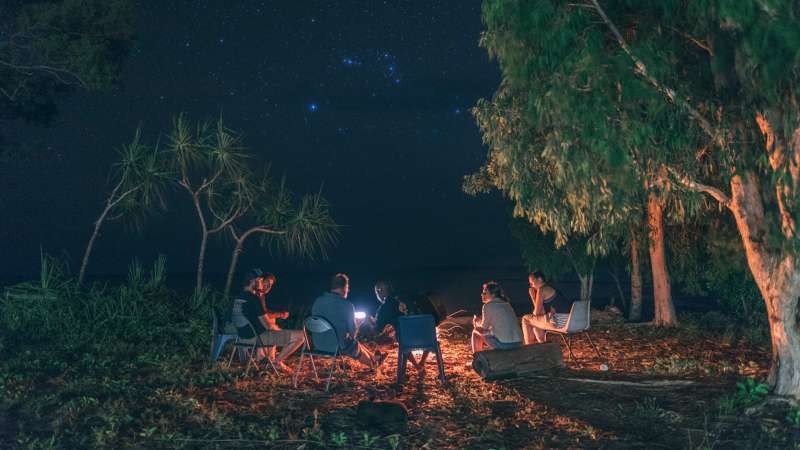
Photo captured by Damien Raggatt
Most of us are accustomed to living in big cities where we move from artificially lit offices, through well-lit streets, to our homes where we spend time in front of screens before collapsing into bed. Sometimes with one hand still attached to a screen until our alarm wakes us up with an unceremonious, robotic beep beep beepitity beep.
On an overland adventure through Australia, your new normal will be sitting down to a campfire as the sun sets, sleeping under the stars and waking up to bird calls. But you won’t be sleeping under any ordinary stars. With minimal light and air pollution, the outback sky offers unfiltered, unabated, unbelievable star viewing opportunities.
GO NOW: EXPLORE PERTH, DARWIN AND EVERYWHERE IN BETWEEN ON THIS 22-DAY EPIC TRIP
You’ll learn a new vocabulary
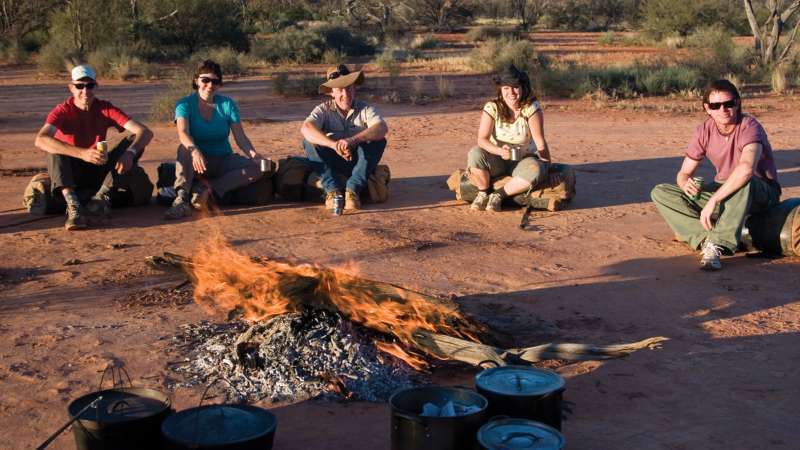
Photo captured by Sally Johnson
Just because you speak English, doesn’t mean you’ll be able to converse freely with every local in Australia. More than 120 different Indigenous languages are spoken in Australia, so on your trip you’ll probably meet many multilingual locals who switch between English and their indigenous tongue. Of course, you’re not expected to be fluent in Gundjeihmi or Yawuru, but it’s a good idea to give a few words a go (even if you botch the pronunciation).
The other vocabulary you’ll have to get your head around is Aussie slang. A ‘dunny’ is a toilet, a ‘frothie’ is a beer, a ‘furphy’ is a tall story, a ‘bush telly’ is a campfire and the word ‘deadly’ means awesome in indigenous culture.
While it may all seem foreign and indecipherable to you in the beginning, it won’t take long before you start telling furphies while drinking frothies in front of the bush telly.
You’ll tackle tough terrain
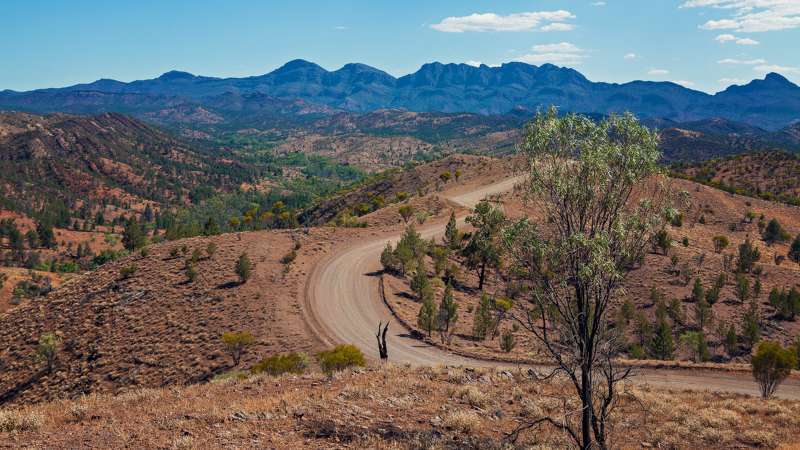
Photo captured by Karen Catchpole
It’s possible to drive around entire nations on nothing more than smooth, sealed bitumen. Australia is not one of those places. And that’s what makes it one of the best overland experiences on the planet.
Travelling overland in Australia, you’ll transition from sealed highways to rough gravel tracks, red dirt roads, and bush tracks only accessible by 4WD (or foot). It will get bumpy. Dust and dirt will fly. It will be amazing.
Some days will require long drives because you can’t rush when negotiating the tricky terrain. These days will give you an opportunity to take in the epic scenery while listening to some true-blue tunes (AC/DC, Yothu Yindi and Midnight Oil are all recommended, but if you need to crank some Kylie then so be it).
GO NOW: ROAD-TRIP FROM PERTH TO BROOME ON THIS RUGGED 10-DAY TRIP
You’ll encounter many things with wings
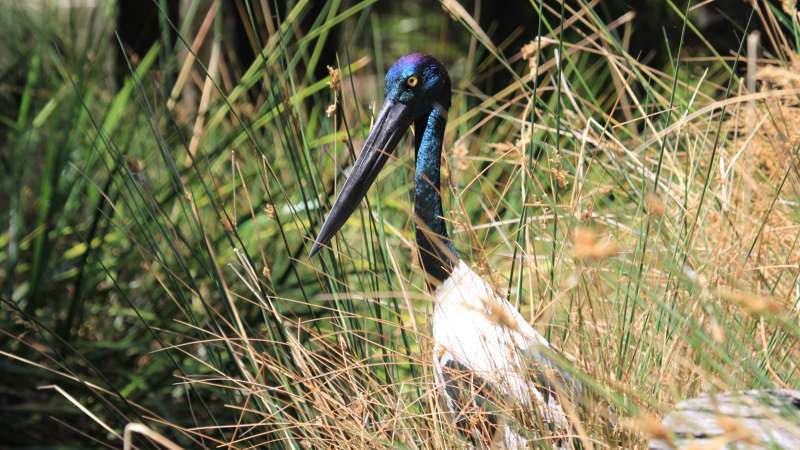
Photo captured by Johan Rentmeesters
Ever wonder why anyone would wear a wide-brimmed hat adorned with corks hanging on strings? Not worn as a fashion statement, cork hats help ward off the notoriously large number of flies living in Australia.
While 30,000 different species of fly can be found in Australia, bush flies and blowflies are the ones that tend to love human company the most. From conglomerating at picnics and barbeques to attaching themselves to the sweaty backs of locals. Flies are ever-present in the Australian outback.
It could be argued that you haven’t really experienced Australia until you’ve accidentally swallowed a fly while biting into a meat pie. And even though fly numbers fluctuate with the seasons, it’s safe to say that by the end of your trip, you’ll have mastered the ‘Bush Salute’ (a reactionary swatting hand movement that has little-to-no impact on fly behaviour).
Thankfully, you’ll also see many other creatures of the winged variety. Fruit bats in Darwin, black cockatoos in Perth, blue-winged kookaburras in Broome, colourful finches at Lake Argyle and hooded parrots in Katherine. These vibrant (and often incredibly loud) birds that aren’t found in the wild anywhere else in the world will become your constant companions.
Oh, and if you hear an eerie screeching sound in the middle of the night, don’t be alarmed. It’s just the bush-stone curlew, whose unforgettable call sounds not unlike a woman screaming.
GO NOW: JOURNEY FROM ADELAIDE TO ALICE SPRINGS ON THIS 7-DAY OVERLAND ESCAPE
You’ll disconnect, then reconnect
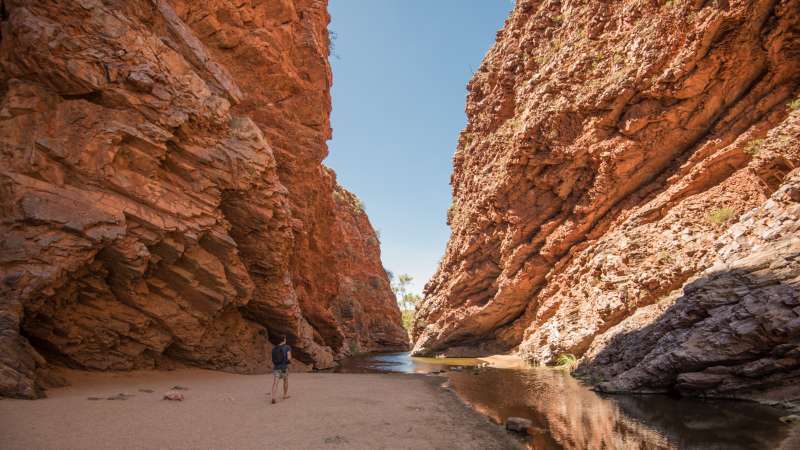
Photo captured by Patrick O’Neill
Unlike many other countries, there are vast tracts of Australia where phone coverage and Wi-Fi signal aren’t available. But don’t panic, there’s always the bush telly (see above) to keep you entertained.
In the beginning, you might catch yourself reflexively scrolling through Instagram or logging into Facebook to find you’ve got no access. Soon enough, your reliance on being connected will start to wane as your connection with the group and the land grows. By the end of the trip, lurking on the internet will be the last thing on your mind.
Of course, there’s always landlines and satellite phones for emergency situations. But otherwise, an overland journey through Australia offers the rare chance to disconnect, then reconnect on an entirely new level.
If you’d like to know more about an Australian Overland adventure, contact our friendly team on 08 8223 5905.


